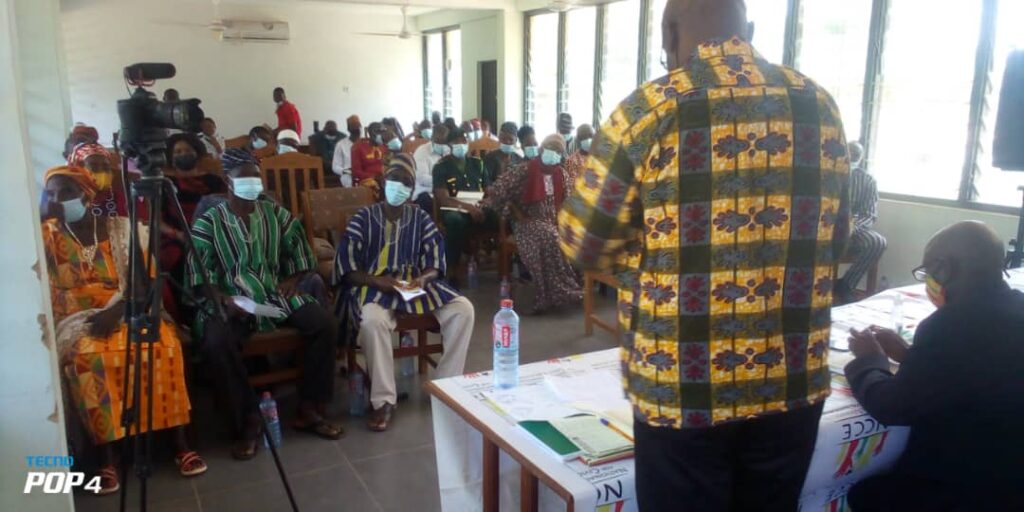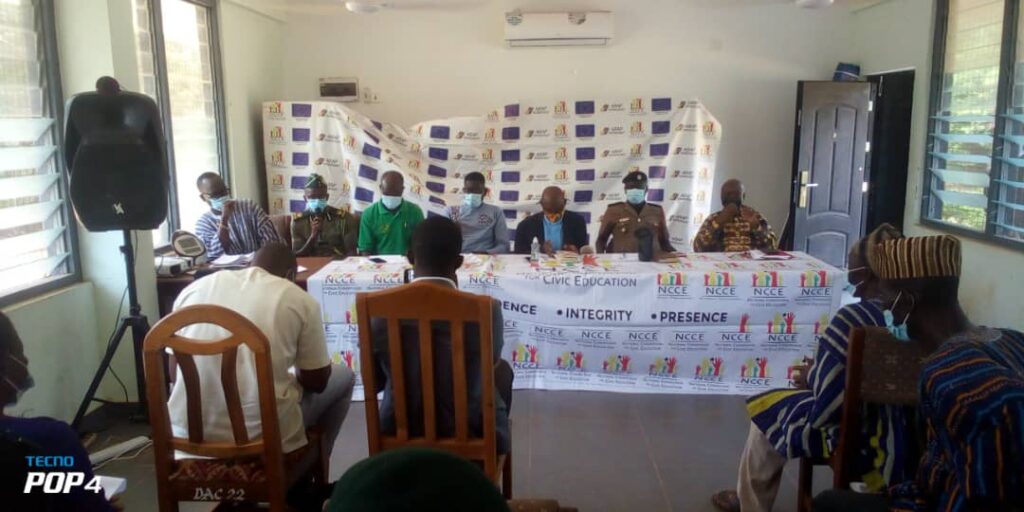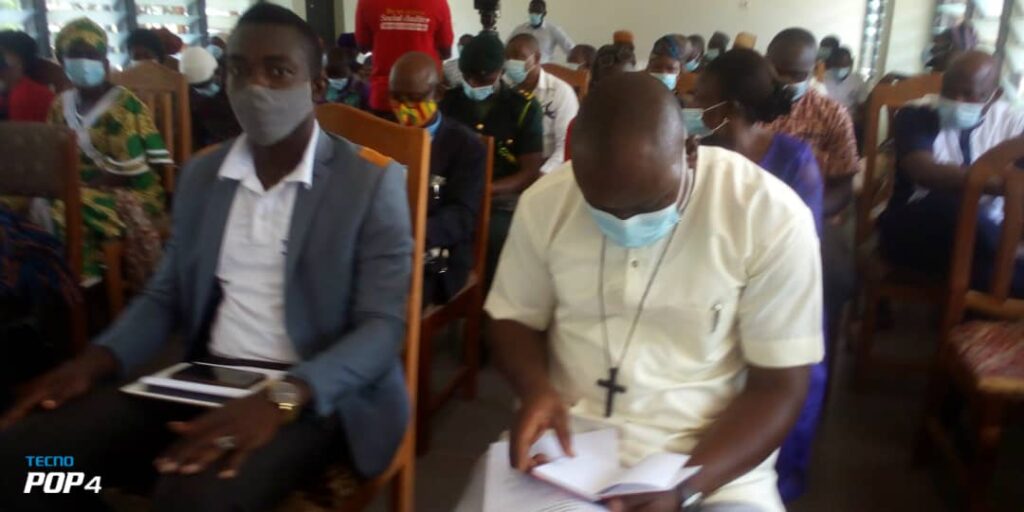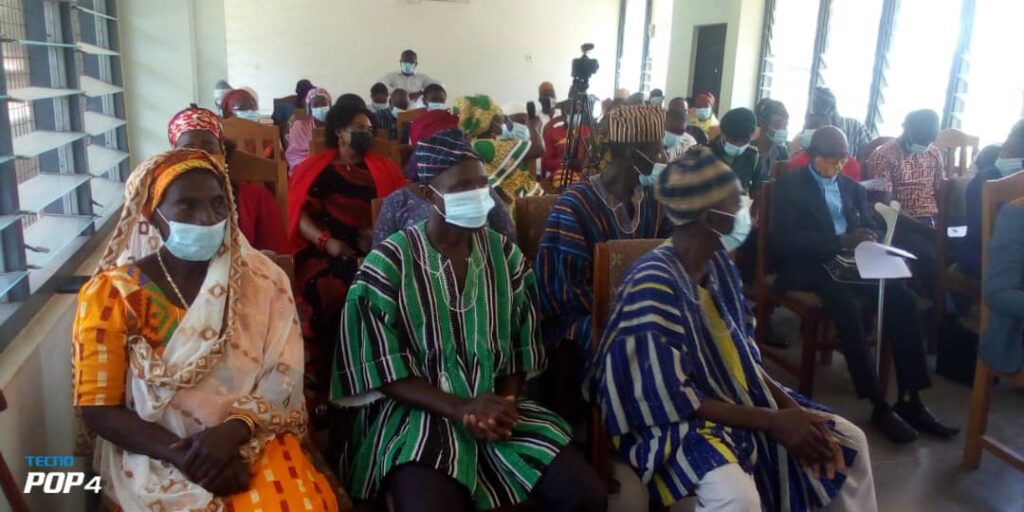www.padfm.com.gh
The National Commission for Civic Education (NCCE) in the Savannah region held a Regional Stakeholders’ Inter Party Dialogue Committee meeting on Preventing Electoral Violence and Providing Security to the Northern Border Regions of Ghana in Damongo on Thursday, November 4, 2021, to sensitize and educate the public on issues about security and it’s related activities.
Speaking at the program, the Savannah regional director Issaka Zito explained that under the European Union sponsored ‘Preventive Electoral Violence and Providing Security to the Northern Border Regions of Ghana’ (NORPREVSEC) project, the NCCE is undertaking stakeholders’ meetings in six (6) out of the fourteen project regions – the five (5) regions of the Northern Ghana and Western North.
These meetings are partly meant to create platform for dialogue among stakeholders on the collective responsibility of addressing the tensions being created by activities of violent extremism groups in the Sahel region and preventing likely spill over Ghana.
Issaka Zito said the broader goal of NORPREVSEC, which is to fight against transnational organized crime, while promoting respect for human rights and Rule of Law. The meeting aims at creating platforms for dialogue on joint efforts to identify early warning signals of extremist violence, community surveillance, and measures to counter radicalization of the youth in the Savannah region.
He emphasized that violent extremism and terrorism remain significant threat to global peace, security and sustainable development. Africa has been principally susceptible and serves as a hotbed for illicit networks. This is due to Africa’s weak institutions, porous borders, ill-equipped security forces coupled with lack of economic opportunities thereby creating settings for extremism ideologies to grow and persist in parts of the continent.

Issaka Zito added the National Framework for Preventing and Countering Violent Extremism and Terrorism (NAFPCVET), is Ghana’s initiative to contain, combat and counter violent extremism and terrorism. It’s mandate, hinges on collaborating with other institutions in the the country, to identify the threat of violence extremism and terrorism and provide architecture, context and strategy to prevent and counter the threat. The NCCE role under the framework, is to carry out public education, dissemination of information, and civic engagement activities to include in the population, security consciousness and situational awareness. However, statistics required to plan and monitor, and provide education to the citizenry regarding this emerging phenomenon in the country are lacking.
The usefulness of data on the risk or threat of violent extremism and other forms of violent is, therefore, crucial to guide policy direction, inform content of education and decision making regarding the containment and combat of extremists’ activities in Ghana.
The NCCE carried out Risk/Threat Analysis of Violent Extremism in Ten Border Regions of Ghana in April, 2021, to better understand the state of violent extremism, and to fill the gaps in knowledge on the subject. The report also provided detailed and comprehensive discussion on the strategies NCCE can adopt through public education to minimize the threat of violent extremism and other forms of violent in Ghana. It also highlights the best communication medium to use in citizens’ education on the subject. He further stated that an assessment of participant’s knowledge on the use of arms and witnessing of violent activities as well as the factors that contribute to violent extremist acts are included in the report.
He emphasized that the most important things for a nation are peace and safety of it’s people, and it’s territorial integrity. It is when these are guaranteed that citizens can go about their lives normally, and strive to improve upon the quality of their circumstances.

The aspiration of Ghana to remain a sovereign, free, peaceful, democratic state and ensuring the survival, safety and well-being of the citizens that occupies it’s rightful place among the comity of nations as a respected and influential nation, is confronted by a number of existing and imminent potential security threats, risks and challenges.
The domestic environment of Ghana is by itself as a society, is a source of a number of threat to national security and stability. The nature and characteristics of the Ghanaian society, it’s diversity in demography, ethnicity, languages, cultural values, belief system, the lack of national youth orientation Program, socio-political history and economic potential are all factors that tend to pose challenges to Ghana’s national security and stability.
Such situations include bye elections, armed robbery, chieftaincy succession conflicts, land boundary disputes, poverty, mob-action against suspected witches and wizards, illegal mining, commercial charcoal production, among others.
He exhort Ghanaians to defend the 1992 Constitution because once it is adopted, it means the people have subscribed to the tenets and practice of democratic governance. In a democracy, all citizens have power to exercise political controls. They can make and form decisions about who leads them, participation in decision making and demand accountability, responsive and responsible governance from their duty bearers at all levels of the society.

Other important areas he talked about include the Public Order Acts, offences and penalties, Actors of Violent Extremism, Strategies for recruiting and radicalization, peace building mechanism, prevention of Violent Extremism in Ghana, how to react during attacks, among others.
They were slide delivery by security agencies such as the national security, the police, criminal department and host of others.
Participants were made to ask questions and express themselves to the issues affecting their everyday security life.

The program was attended by political actors, security agencies, youth groups, women groups, religious and traditional leaders, People Living With Disabilities, among others.
Source: Abdulai Zulkaninu / zulqanoah16@gmail.com

















